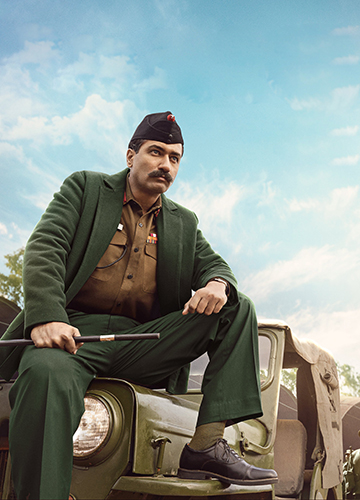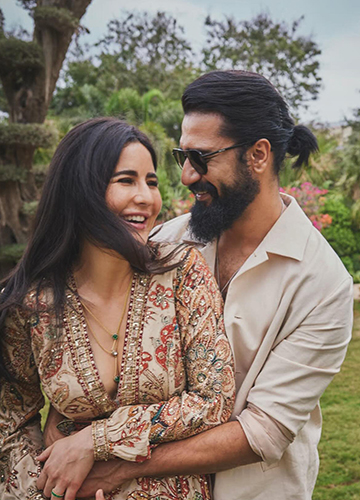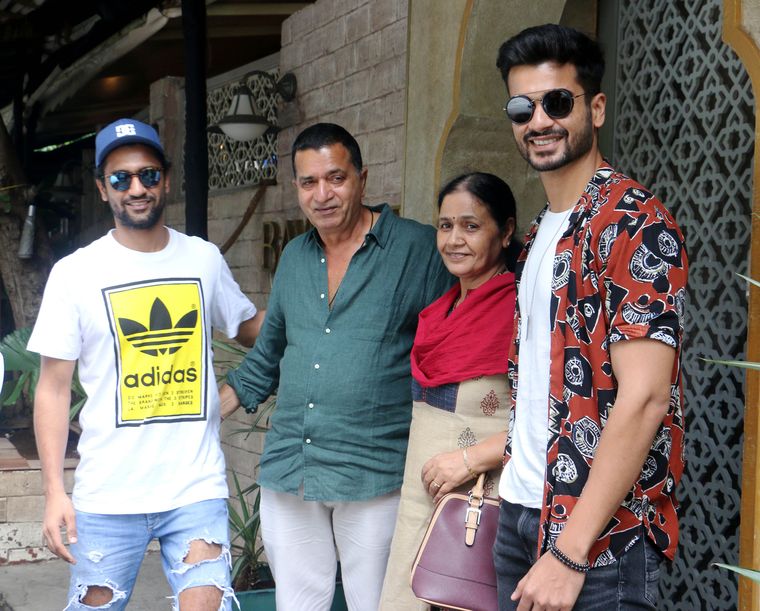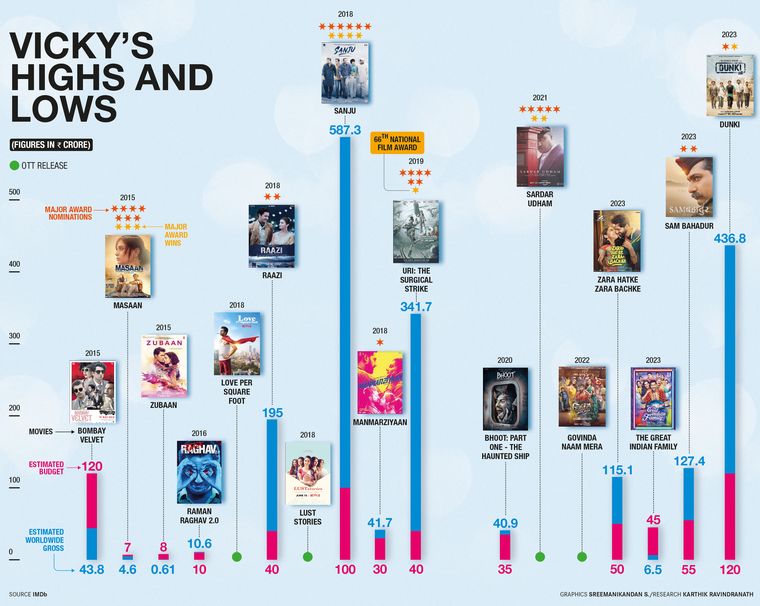Close to 90 minutes into Sam Bahadur, which released last December, Field Marshal Manekshaw (a masterly Vicky Kaushal) sits down for an interview with a woman journalist in Kashmir. It is July 1969, and he has just been made Army chief. The lady asks him why the busy man was in Kashmir and not Delhi; was war imminent? “Oh no sweetie! I keep meeting my jawans very often. I feel alive around them,” he replies. The journalist, taken aback, asks if he addresses everyone that way, because she felt he was flirting with her. And then, in his trademark style, Manekshaw bends forward, giving her his full attention, his light eyes twinkling with humour and head slightly tilted sideways, and says, “Sweetie, had I been flirting with you, then be sure this interview would have gone much longer.”
It is one of the most impressive eight seconds of film acting in recent history―with a few words and loads of charm, an actor pulls you into his character’s world. So close is the portrayal, in terms of both body language and disposition, that one could easily believe this was Manekshaw himself.
It might seem unusual to say, especially as the actor already has a national award on his shelf, but this role was Kaushal’s career-defining moment. To get it right, he had to go beyond the field marshal’s light eyes and bushy moustache. “Vicky internalised the slouch and the hunch around the shoulders so well, despite being taller than Sam,” says Bhavani Iyer, the scriptwriter who worked with Kaushal on Raazi and Sam Bahadur. “And once, when he was on a break and needed to complete a dance sequence for another film, the dance director told him, ‘Sir, if you can please straighten your shoulders’; Vicky was still in Sam mode.”
As we begin talking about Sam Bahadur, Kaushal immediately recalls THE WEEK’s 2021 cover story on the untold stories of the field marshal. “My focus was so much on getting his confidence and charisma right, that his quirks were overshadowed and could not be a part of the film,” he says. “But I am confident I have seen every image of the field marshal on the internet, in books and elsewhere.”
He sifted through hundred of photos of Manekshaw walking, sitting and speaking to derive a pattern, but most of the body language, wit and swagger came to Kaushal through Maya―the field marshal’s daughter―whom the actor describes as “Manekshaw in motion”.
Period films and biopics have long been fodder for box-office success, and also offer an alluring challenge to actors. Kaushal, in that regard, is becoming quite the craftsman. While for Sam he had photos and keen-to-help family members, this was not the case with Shoojit Sircar’s Sardar Udham (2021). There, understanding the emotional path was more crucial than getting the body language right. Kaushal dove deep into his conscience to bring to the fore the revolutionary’s trauma at having witnessed the barbaric Jallianwala Bagh massacre, and his fight for revenge. The essence of Udham had to be captured; his gait and other physical traits could be imagined into existence.
“Playing Sam was way tougher than anything I have done before,” he says. “People think it is easy when you have reference, but it is not; it is actually a double-edged sword because then you can compare and see by how much you have missed the mark.”
In Sardar Udham and Sam, the characters are decades apart and in both he wears patriotism on his sleeve without resorting to chest thumping and jingoism, and ages convincingly in both. Yet, there is a world of difference and one will never be able to say that he is repeating himself.
Now, with two successful biopics in his rear-view mirror―Sardar Udham bagged five national awards and Sam Bahadur made north of Rs100 crore worldwide―Kaushal is now driving towards another: he will play Chhatrapati Sambhaji Maharaj, the son of Shivaji, in a movie directed by Laxman Utekar, with whom he has worked in the hit romantic-comedy Zara Hatke Zara Bachke.
“His personality, like his height and physique, matches that of Chhatrapati Sambhaji Maharaj,” Utekar had said in an interview. “He is also a fabulous performer. We did not do any look test as I was sure he was the one. He will train for four months in sword fighting, horse riding and a few other things. And once we are satisfied, we will start shooting.”
It is during this transition into Sambhaji, a thick, flowing beard in place, that we meet Kaushal at his spacious Juhu home. He is candid, chatty, warm and friendly. Dressed in a ganji and track pants, he is seated at a huge wooden table that shines with mahogany polish and provides a sharp contrast to the otherwise minimalistic decor in cream and white. “You cannot not be a part of fabulous stories,” he says about picking biopics, a mug of black coffee in hand. “It gives me a kick. Even I am trying to figure out what stimulates me. But as of now, I know that this is it. The day I feel like I am getting stereotyped, I will consciously think of that.”
Though he has found some success at the box office, Kaushal is still very much an actor and not yet a star. He says so himself. But those around him insist that it would be good to not bracket him into the “limited, restrictive and constricted notions” of stardom. “Vicky is an actor. You could call him a character actor, a method actor or whichever terminology suits you,” says Iyer. “The fact that he can easily slip into any character’s shoes with dignity is because of his ability to surrender himself to the role and to the director’s vision. He will never hijack a scene from a co-actor. A lot of the cues of the performance come from him in an instinctive manner and he wears his incredible talent and hard work lightly. He does not come on the sets with any baggage.”
Iyer would know, having seen him on two sets a few years apart. She recalls a table read for Raazi, in which Kaushal barely had any dialogues. So, when the other actors read out their lines, he would chime in with, “Iqbal looks on thoughtfully”, “Iqbal reacts considerately” etc. The character of a Pakistani army man―who was the husband of the Indian spy Sehmat (Alia Bhatt)―went on to be appreciated for his balanced portrayal. He was a poet in military uniform, and Kaushal brought a sense of decency and humanity to the part. “I do not think anyone else could have pulled it off,” says Iyer. Following the release of Raazi, Iyer promised to give him more ‘talk time’. With Sam Bahadur, she kept her promise. “After he read the script of Sam Bahadur, he texted me, saying, “You have gone to the other extreme now. Sam has most of the lines in the film.’”
Perhaps this was a reward for never saying no to any work, however small, when he was breaking in. And even in those short roles, he gives the viewer something concrete, like in the latest Dunki, where he plays a man learning English so that he can get a visa to fly to his lover in UK. It was a heart-breaking role that ultimately stood out more than any other in the star-driven movie.
“This journey of starting with art house and then transitioning into commercial is not by choice,” says Kaushal, throwing his hands up in the air. “Those were the only options I had. It is not that I had a Singham or Rocky Aur Rani Kii Prem Kahaani and I chose Masaan (his first film).”
His journey into films began as an assistant director on the sets of Anurag Kashyap’s Gangs of Wasseypur. At the time, his father, action director Sham Kaushal, was working with Kashyap and knew that there were several ADs on set. “I phoned Anurag Kashyap requesting him to let Vicky join as an assistant,” says the senior Kaushal. His son had just completed his studies and an acting course. “That was the turning point in his life,” says the father. “Kashyap became his first mentor and by the time the film was getting over, he was assigning Vicky some very good responsibilities.”
Shlok Sharma, the second unit director on Gangs and a longtime friend of Kaushal, says, “At the time, Vicky was this tall and thin boy who would serve us aloo parathas with white butter in the modest Kaushal household. If you were visiting the Kaushals, it was a given that they would not let you leave without having some of their yummy parathas.”
Recalling those days, Sharma adds, “I remember Vicky would always travel by bus, despite being relatively well-off, and we would travel by rickshaw. As a trainee AD, he was very hardworking and a director’s dream. [People] would fight to have Vicky in their team because he would do everything. We did not expect this from him as he was the son of a known stunt director.”
After that stint, other AD offers kept coming in, but Kaushal knew his calling was in front of the camera. So, when Kashyap was making a short film, Murabba, with Amitabh Bachchan, Kaushal refused to join him as an AD. “It really hurt me,” says Sharma, who was with the second unit of the film. “He was so clear that he did not mind staying without work, although he was doing theatre then.”
The next phase was hard. Word had spread in Aram Nagar―the hotbed for parallel cinema in Mumbai―that Kaushal was a good AD. “But I did not want to do that because I knew I would be pulled into direction and then when I would ask them to give me a role as an actor, they would not trust me,” says Kaushal. He left Aram Nagar and started doing theatre with groups such as Motley, Aranya and Rage Productions, where he worked with stalwarts such as Naseeruddin Shah and Kumud Mishra. “There are actors who perform in a vacuum, who concentrate on their own scenes and moments,” says Mishra, who worked with Kaushal in the film The Great Indian Family. “But an ideal actor is the one who is giving. When Vicky works with any actor, he gives not because he is doing a favour, but because it is his personality. And his process of getting into the character is very internal.”
The first time Kaushal faced the camera for a full-length feature film was for a small role in Luv Shuv Tey Chicken Khurana in 2012. “I remember I was shooting outdoors and Vicky called me saying, ‘Papa, I have got this film where I play the younger version of Kunal Kapoor, but I am in two minds’,” says the father. “I told him to sit in front of the temple at home and pray earnestly, and then do whatever came to his mind instinctively. After five minutes, he called to say that he would do it. I asked him to follow his heart.”
He, too, had followed his heart. The Kaushals came to Bombay from a small town in Punjab, with dreams of making it big. Bollywood happened and the rest is, well, filmy. “I made my own way in Bollywood and encouraged them (sons Vicky and Sunny) to do so, as well,” he says.
Did having an action-director father help the son land any roles? “Will someone bet Rs25 crore and six months of their life to make a film based only on my name? I was not a star,” he says. “Yes, people did know that Vicky was Sham Kaushal’s son and so the trust and credibility were always there. But that is about it. If I could make it as a first-generation person in this industry, why couldn’t my sons? Both my boys are hardworking and honest. But all three of us knew that they will not get a film based on my name. The maximum that could happen was that they would be called to the [filmmaker’s] office for tea. What happened after that would depend entirely on merit.”
Recalling an anecdote from the sets of Zubaan, Kaushal’s first film as the main lead on which he, too, worked, the father says, “The scene was such that he is fighting off some goons who hit him hard on his knees with hockey sticks. To my surprise, he was limping perfectly and most naturally, as if he had actually been hit. Later, I got to know that before the shoot, Vicky had put a pebble inside the shoe so as to make the limping look real. I had tears in my eyes because I had just worked with a promising newcomer, who happened to be my son.”
Though Zubaan―in which he played Dilsher, a boy who loves music―did not do well, it is close to Kaushal’s heart. “I told Mozez (Singh, the director) that we should really do this film again,” he says. “That film, I truly believe, had its heart and soul in the right place. But I feel like we were all too new to kind of have the expertise to make that film. I shot as a lead and then I shot for Masaan. But Masaan released before Zubaan. For everyone involved, what mattered was that nobody was looking for validation with Zubaan because we felt that nobody was looking at us anyway and we might as well have fun. Both Masaan and Zubaan got made like that.”
Masaan was the film that turned many a head towards Kaushal. It might not have set the box office on fire, but it was a film that the industry watched, and one that opened doors for the newcomer. “For the first time, I started getting calls straight from directors asking me to meet them in person. And not because they had a film for me; they just wanted to know me,” he says with a glint in his eye. “Karan Johar called me to his old office in Khar. He knew my dad, but did not know I was his son.”
Kaushal at the time did not have a manager, nor a PR team. “It was just me,” he says. “I would drive myself, park and go talk to people. Karan advised me to not be hasty, choose wisely and be positive. He also said that the start is easier than maintaining the momentum and growing from there.”
And grow he did. After Masaan and a few other roles, he achieved what is seen as the “arrival” of an actor―getting a role without an audition. This was for Kashyap’s Manmarziyaan, alongside Taapsee Pannu and Abhishek Bachchan. “Manmarziyaan is the perfect example to explain the depth of Vicky’s performance and the internalisation of the character, so much that it strangely makes you fall in love and root for a commitment-phobic lover,” says Shilpa Srivastava, who was Kaushal’s co-intern on Gangs.
Manmarziyaan was followed up by debutant Aditya Dhar’s Uri, which won Kaushal his first national award for the portrayal of an Army officer in a dramatised version of the surgical strike the Indian Army carried out on Pakistani territory. It was the first time Kaushal tasted massy success, with the dialogue, ‘How’s the josh?’ becoming a rallying cry across the nation.
“I am very happy with the way it (his career) has panned out,” says Kaushal. “It was the most beautiful way that it could have happened for me because I got to learn so much, like commando training. The initial films were so tight budgeted that I am now used to working without the vanity. Where the resources are so limited that you know how to put the film first.”
This conversation is part of our second meeting, also at his Juhu home. His wife, actor Katrina Kaif, is in Delhi for film promotions. When she returns, Kaushal will leave for the Sambhaji shoot. “This is how life is on the fast lane,” he says. “So once we pause, we make the best of it.”
The apartment is lavish and spacious. The windows are heavy and are designed to block out the noise from the flights that pass overhead. A lovely chandelier and a vase with fresh flowers welcome you. “This is all her. She has done up the house so beautifully. If it was up to me, I would be happy with just a fan, a light and a mattress,” he says, laughing out loud.
There are also a lot of books around. “She is more of a reader, but I have read each and every one of these books you see there,” he says, pointing to a shelf. He particularly talks of the book on Mumbai Police commissioner Rakesh Maria and recommends Shoe Dog, the memoir of Nike owner Phil Knight. “I love reading memoirs and biographies,” he says.
As the conversation flows, an extra large mug arrives. “Some oatmeal protein shake yaar,” he says. “I do not like it at all. I cannot wait for this punishment to end so that I can dive straight into chhole bhature.”
For all his fame and fortune, this earthiness seeps through in his demeanour. “He has no airs about him; in fact, he is literally the boy next door who is in love with his Punjabi roots,” says actor Neha Dhupia who, along with her husband, actor Angad Bedi, share a warm friendship with both Kaushal and Kaif. “He is famously known in our house as Vicky chachu; the day our daughter was born, he was one of the first people to reach the hospital. Even when Angad lost his dad (legendary India spinner Bishan Singh Bedi), Vicky was shooting far away, but was constantly checking on us on the phone. I have seen him literally sit by the road and pop open his tiffin box when hungry, unmindful of his stardom and of the hundreds of people who stop to stare at him.
Dhupia and Bedi have been close witnesses to Kaushal’s love story. “The first time I got a sense something was there was when I heard it from Katrina,” says Dhupia. “The first time Angad got a sense was when he heard it from Vicky. And we were not exchanging notes. We were just quiet. I think he had his version and I had her version and both were matching and so we were like, they will definitely get together soon. I remember, at the wedding, Vicky was hands on, from welcoming guests to managing the food to deciding who’s dancing on which song. It was a blend of two different cultures and everyone from England was jamming to a live Punjabi band.”
Kaif, says Dhupia, took a liking to Kaushal when she watched Uri. She did not know Kaushal then. “Then many days later, we spoke over the phone and she said it. I had butterflies in my stomach,” says Dhupia.
Kaushal might be part of a big circle socially, but his friends say there are a few who he cocoons up with. Srivastava is one of them. “She is the kind of friend who will never tell you anything good about me,” he says. “She is my harshest critic. But when she saw Sam, she hugged me and was in tears. That is when I felt that I have done something good.”
Kaushal keeps his old friends close. “Even on Christmas, those lunches do not end because people do not want to leave,” says Dhupia. “His old engineering friends come over all the way from the US and even at his wedding, you could see that his friendships are real. Katrina herself has core family values in place as she comes from a big family―eight of them.”
Bedi elaborates: “They are both warm hosts but two completely different people. On Christmas, Katrina does a wonderful spread―there is turkey, fish, different food for those who are vegan, gluten free and with certain dietary restrictions, and Vicky does not interfere because Katrina rules. Whereas when Vicky hosts the evening and decides the menu, I think he is one of the first people to make sure he is at the table first. His palette is very desi and Punjabi, with dollops of ghee, butter, mirch masala. Together they are wonderful hosts. As the party starts, the music is soft and mellow and you can tell that it is to Katrina’s liking. But, as the evening progresses, there is a different energy and Punjabi music kicks in and Vicky and his close friends groove to it like there’s no tomorrow.”
So, just how did two people with such diverse personalities get together? “Katrina comes from a completely different geography,” says Kaushal. “But if you meet her family, you will see that her core life principles are similar to mine. In terms of family, ours is a middle-class upbringing, [where you value] what you have and how you have earned it. When we have family get-togethers, the difference is only linguistic. Actually, I was taken by surprise when I got to interact with her; it is not what it seems from afar. I was a fanboy and admired her for a long time... even if she was an astronaut, I would have fallen in love with her.”
Kaif has been in the industry for around two decades and has been part of several blockbusters. Kaushal knows and respects this. “When it comes to the profession, she is far more experienced than me,” he says. “And also, she has lived a life that is more independent. I have had a more protected life. She has come up the hard way. Even when language was not by her side, she struggled her way through and really made that spot her own, which is amazing.”
Kaushal’s parents feel blessed as they “always missed having a daughter” at home. “She tries speaking in Punjabi and understands it perfectly,” says her father-in-law. “There are so many vegetables we eat now because she loves them so much. Now, when people ask me how they should introduce me, I tell them, ‘not as an action director, but as the father of Vicky and Sunny, and the father-in-law of Katrina Kaif.”






